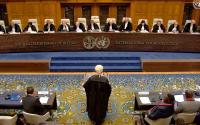14 January 2008Andrew Clark
The American motor industry's rush to go green has captured even the environmental lobby's most despised car - the Hummer - with plans announced yesterday for an ethanol-powered version of the military-style vehicle.
General Motors kicked off the Detroit motor show by revealing biofuel-propelled prototypes of a Hummer and a Saab, and by urging the US government to make ethanol more widely available.
Hated by conservationists for its dismal fuel efficiency of barely 16 litres per 100km (15 miles a gallon), the Hummer has frequently sparked protests - a campaign group burned down a California showroom and owners have had their Hummers daubed with graffiti.
The ethanol-powered version, the HX, is still likely to provoke disapproval in some quarters. It is more than 2 metres (6.75ft) wide and retains the brand's gargantuan, tank-like appearance, based on the US army's Humvee armoured car.
GM is anxious to reignite the Hummer's waning popularity among young people. It said it was logical that a car "rooted in outdoor adventure" should be tailored to minimise its impact on the environment.
Rick Wagoner, chief executive of GM, said the industry could not afford to wait for the development of electric and hydrogen technology to offset the cost of oil at $100 (£50) a barrel. "Ethanol is by far the best opportunity we have to reduce oil consumption and oil imports in the near and medium term," he said.
Wagoner said that 96% of US transport relied on oil and cited government projections that demand for energy would rise 70% by 2030. "As a business necessity and as an obligation to society, we need to develop alternative sources of propulsion, based on diverse sources of energy."
GM has struck a partnership deal with an Illinois company, Coskata, which is investigating a way to produce ethanol for as little as $1 a barrel using a mixture of synthetic gas, water and specially cultured bacteria. The firm urged the White House to introduce either incentives or legislation to increase the paltry number of ethanol filling stations in the US.
The car industry's annual gathering in its Michigan heartland is shot through with environmental awareness this year. Toyota, Lexus and a host of other brands have given their most prominent display spots to hybrid-powered vehicles.
David Cole, chairman of the Michigan-based Centre for Automotive Research, said manufacturers were coming to terms with the need for an "absolutely gigantic leap" in technology. "There's a recognition that environmental issues are a really big deal. We're seeing an emphasis on green from all auto manufacturers," he said.
With other projects such as accident-proof "intelligent" cars and even driverless vehicles under discussion, Cole said a technological race was gathering speed and, despite their cash-strapped finances, Detroit's big three carmakers were anxious to outpace their wealthier Japanese competitors. "It's nice to be smart and rich - but smart is, really, more important," he said.
On the show's opening day, there was positive news from the British firm Bentley, which said it had exceeded sales of 10,000 vehicles for the first time through a 7% rise in volumes to 10,014 last year.
Ford unveiled a sleek new pick-up truck, the F-150, which it hopes will revive its flagging leadership in the US truck market. It is showcasing a new technology called EcoBoost, which uses turbocharged direct-injection techniques to improve fuel economy by 20% and cut carbon emissions by 15%.
Over the last two years, Ford has announced 30,000 job cuts. Bill Ford, the chairman, said the embattled company faced a challenge in creating "desirable, exciting and responsible" cars.
But Chrysler stole the show by bringing a herd of 120 longhorn cattle from Oklahoma and driving them through Detroit's streets to celebrate the public debut of a Dodge Ram truck.
Unfortunately, media attention was diverted from the heavily hyped truck because two of the animals chose the moment of its arrival to mount each other in an affectionate display of bovine athleticism.
http://www.guardian.co.uk/business/2008/jan/14/automotiveindustry






